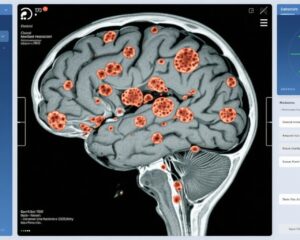Highlight
1. Change in circulating tumor DNA (ctDNA) at 1-month post-treatment initiation predicts progression-free survival (PFS) and overall survival (OS) in dMMR/MSI-H metastatic colorectal cancer (mCRC) treated with immune checkpoint inhibitors (ICIs).
2. Baseline ctDNA positivity or concentration alone does not correlate with patient outcomes.
3. Patients treated with avelumab who exhibit favorable early ctDNA response have significantly improved survival compared to chemotherapy-treated patients.
4. Combined early ctDNA response and RECIST assessment accurately predict long-term survival, potentially guiding personalized treatment strategies.
Study Background and Disease Burden
Metastatic colorectal cancer (mCRC) is a major contributor to cancer morbidity and mortality worldwide. Approximately 5% of mCRC cases harbor deficient mismatch repair (dMMR) or microsatellite instability-high (MSI-H) status, which results in a hypermutated phenotype that exhibits notable sensitivity to immune checkpoint inhibitors (ICIs). The introduction of ICIs such as avelumab has transformed the therapeutic landscape for dMMR/MSI-H mCRC, yielding favorable responses and durable remissions. Despite this, primary resistance to ICIs and the challenge of determining optimal timing for treatment discontinuation hinder clinical decision-making. Reliable biomarkers to predict treatment response and long-term outcomes are critically needed to optimize patient management and resource allocation in this subset of patients.
Study Design
This prespecified secondary analysis was conducted within the framework of the SAMCO-PRODIGE 54 randomized clinical trial, involving 99 patients with dMMR/MSI-H mCRC enrolled across 49 sites in France from April 2018 to April 2021. Participants received second-line treatment with either avelumab (an anti-PD-L1 antibody) or standard chemotherapy, with or without targeted agents. Blood samples for plasma ctDNA analysis were prospectively collected at baseline before treatment initiation (V1) and at 1 month post-treatment initiation (V2). CtDNA quantification was performed by digital droplet polymerase chain reaction (ddPCR) amplification of bisulfite-converted cell-free DNA targeting tumor-specific methylation markers of the WIF1 and NPY genes. The primary outcomes evaluated were progression-free survival (PFS) and overall survival (OS), analyzed in relation to baseline ctDNA status (positivity or concentration) and early ctDNA change (9ctDNA9 defined as [V1-V2] 9 V1).
Key Findings
Among the 99 patients with available baseline ctDNA samples, neither baseline positivity nor concentration of ctDNA correlated significantly with PFS or OS, indicating limited prognostic value of static ctDNA measurements at treatment initiation. However, in the 74 patients with serial samples at both V1 and V2, dynamic changes in ctDNA emerged as a strong predictor of outcomes. Patients with a favorable ctDNA response (greater reduction in ctDNA levels at 1 month, dichotomized at the median) had significantly improved PFS (hazard ratio [HR] 2.98; 95% confidence interval [CI], 1.77-5.01; P < .001) and OS (HR 3.61; 95% CI, 1.81-7.17; P < .001) compared to poor responders.
This prognostic effect was more pronounced in the avelumab-treated group, where the ctDNA response predicted PFS (HR 4.22; 95% CI, 1.77-10.1; P = .001) and OS (HR 17.40; 95% CI, 3.82-79.70; P < .001) more strongly than in the chemotherapy group (PFS HR 2.09; 95% CI, 1.03-4.21; P = .04; OS HR 1.51; 95% CI, 0.61-3.72; P = .38). Furthermore, avelumab conferred a significant PFS benefit over chemotherapy among favorable ctDNA responders (HR 0.33; 95% CI, 0.14-0.77; log-rank P = .008), whereas no such advantage was observed in poor responders (HR 1.32; 95% CI, 0.67-2.62; P = .42).
Integrating early ctDNA response with RECIST 1.1 radiological assessments enhanced the prediction of long-term survival, improving risk stratification. Multivariable analyses confirmed that lack of ctDNA response was associated with a markedly increased risk of disease progression and death in the avelumab-treated cohort (HR 7.27; 95% CI, 2.23-23.7; P = .001), but not in patients receiving chemotherapy. This suggests that early ctDNA dynamics may specifically serve as a biomarker for immune-based therapies rather than conventional chemotherapy.
Expert Commentary
The findings from this robust secondary analysis underscore the clinical utility of monitoring ctDNA dynamics early in treatment as a non-invasive biomarker to predict long-term outcomes in dMMR/MSI-H mCRC receiving ICIs. Unlike baseline ctDNA levels, which lacked prognostic significance, the change in ctDNA at 1 month after treatment initiation demonstrated strong predictive value, particularly in patients treated with avelumab. This aligns with the biological rationale that early tumor DNA shedding reflects tumor burden and immune responsiveness, which are critical determinants of ICI efficacy.
By combining ctDNA assessments with traditional imaging criteria (RECIST 1.1), clinicians may better identify patients likely to benefit from continuing immunotherapy versus those who may require alternative treatment strategies. This is especially pertinent given the risk of immune-related adverse effects and the high costs associated with prolonged ICI therapy.
Limitations include the moderate sample size and focus on second-line settings, which may affect the generalizability to frontline therapy or other tumor types. Additionally, while methylation markers WIF1 and NPY were effective in this context, validation in larger cohorts and with other ctDNA assays is warranted.
Conclusion
This secondary analysis of the SAMCO-PRODIGE 54 trial provides compelling evidence that early ctDNA change serves as a dynamic biomarker predictive of survival outcomes in dMMR/MSI-H mCRC patients receiving ICIs. Incorporating ctDNA monitoring into clinical practice could refine patient selection, optimize therapy duration, and inform timely treatment adjustments, ultimately improving personalized cancer care.
References
1. Taïeb J, Sullo FG, Lecanu A, et al. Early ctDNA and Survival in Metastatic Colorectal Cancer Treated With Immune Checkpoint Inhibitors: A Secondary Analysis of the SAMCO-PRODIGE 54 Randomized Clinical Trial. JAMA Oncol. 2025;11(8):874-882. doi:10.1001/jamaoncol.2025.1646.
2. Overman MJ, Lonardi S, Wong KYM, et al. Durable Clinical Benefit with Nivolumab Plus Ipilimumab in DNA Mismatch Repair-Deficient/Microsatellite Instability-High Metastatic Colorectal Cancer. J Clin Oncol. 2018;36(8):773-779. doi:10.1200/JCO.2017.76.9901.
3. Cristescu R, Mogg R, Ayers M, et al. Pan-tumor genomic biomarkers for PD-1 checkpoint blockade-based immunotherapy. Science. 2018;362(6411). doi:10.1126/science.aar3593.
4. Diehl F, Schmidt K, Choti MA, et al. Circulating mutant DNA to assess tumor dynamics. Nat Med. 2008;14(9):985-990. doi:10.1038/nm.1789.


